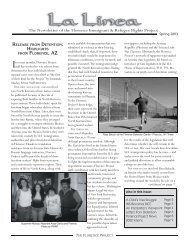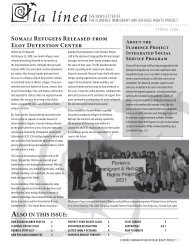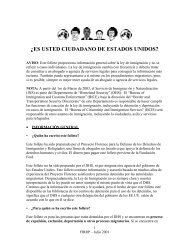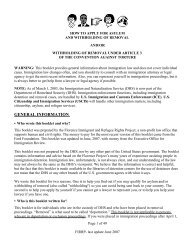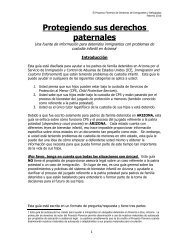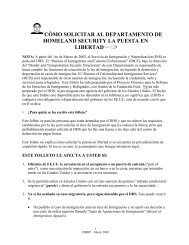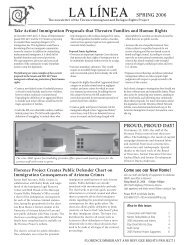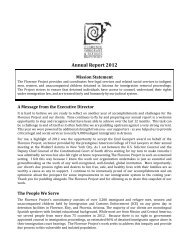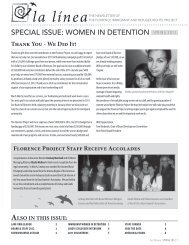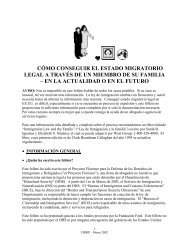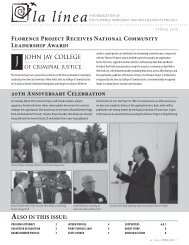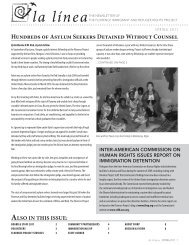quick reference chart and annotations for determining immigration ...
quick reference chart and annotations for determining immigration ...
quick reference chart and annotations for determining immigration ...
Create successful ePaper yourself
Turn your PDF publications into a flip-book with our unique Google optimized e-Paper software.
Immigrant Legal Resource Center, Florence Immigrant <strong>and</strong> Refugee Rights Project,<br />
Maricopa County Public Defender August 2012<br />
solicitation, facilitation should be treated as a separate offense, this argument is not likely to be<br />
successful.<br />
Other Grounds: Drugs. Regarding controlled substances, in Matter of Del Risco, 20 I&N Dec.<br />
109, 110 (BIA 1989), the BIA held that facilitation of sale of cocaine under ARS § 13-1004 is a crime<br />
that “relates to” a controlled substance <strong>and</strong> there<strong>for</strong>e is a basis <strong>for</strong> deportation. However, Del Risco may<br />
have been overruled in the Ninth Circuit by Coronado-Durazo v. INS, 123 F.3d 1322, 1326 (9th Cir.<br />
1997), discussed above, if the principles applied to solicitation in that case would require the same result<br />
<strong>for</strong> facilitation. In Del Risco the Board reasoned that although facilitation is a distinct offense from the<br />
underlying offense of sale, the nature of the offense still related to controlled substances. But in<br />
Coronado-Durazo the Ninth Circuit adhered to a “plain language” analysis, pointing out that solicitation<br />
(which also could be said to “relate” to controlled substances) was not listed in the drug grounds <strong>and</strong> was<br />
a generic offense, distinct from controlled substance offenses. While solicitation is by far the safer plea,<br />
defense counsel facing a drug charge also could consider facilitation as better than a plea to a straight<br />
drug offense. See Note: Drugs.<br />
Other grounds: In general. Counsel should assume that a conviction <strong>for</strong> facilitation does not<br />
avoid deportation grounds relating to domestic violence/stalking/child abuse, firearms, or managing a<br />
prostitution business; <strong>and</strong> inadmissibility <strong>for</strong> two or more convictions with an aggregate sentence of five<br />
or more years. As in the aggravated felony category, facilitation should be used only when there is no<br />
other alternative. However, if a plea to facilitation makes the offense a misdemeanor, it might prevent the<br />
offense from being a crime of violence (because there is a broader test <strong>for</strong> when a felony constitutes a<br />
crime of violence than when a misdemeanor does) <strong>and</strong> thereby prevent it from being a crime of domestic<br />
violence. See discussion in 1. attempt, supra <strong>and</strong> Note: Domestic Violence.<br />
5. Negligent Homicide, A.R.S. § 13-1102<br />
“A person commits negligent homicide if with criminal negligence such person causes the death of<br />
another person.” ARS § 13-105(d) states that "’Criminal negligence’ means, with respect to a result or to<br />
a circumstance described by a statute defining an offense, that a person fails to perceive a substantial <strong>and</strong><br />
unjustifiable risk that the result will occur or that the circumstance exists. The risk must be of such nature<br />
<strong>and</strong> degree that the failure to perceive it constitutes a gross deviation from the st<strong>and</strong>ard of care that a<br />
reasonable person would observe in the situation.”<br />
Summary: Under current law this is a good plea, because negligence should not be a crime of<br />
violence or moral turpitude offense. As always, however, counsel should make every attempt to obtain a<br />
sentence imposed of less than a year to make sure the offense is not an aggravated felony.<br />
Crime Involving Moral Turpitude (CMT): Negligent homicide should not be held a CMT.<br />
See Matter of Perez-Contreras, 20 I&N Dec. 615 (BIA 1992) (third degree assault with criminal<br />
negligence, in which offender failed to be aware of a substantial risk of injury flowing from his conduct,<br />
was not a CMT). Where there is “no intent required <strong>for</strong> conviction, nor any conscious disregard of a<br />
substantial <strong>and</strong> unjustifiable risk, we find no moral turpitude inherent in the statute.” Id. at 619.<br />
However, under Matter of Silva-Trevino, 24 I&N Dec. 687 (A.G. 2008), it is possible that an <strong>immigration</strong><br />
judge will inquire about the facts of the case, <strong>for</strong> purposes of moral turpitude only. While this should be<br />
held as improper, because the element of “negligence” should define the case, counsel should be prepared<br />
<strong>for</strong> this possibility.<br />
Arizona Criminal Chart with Explanatory Endnote – August 2012<br />
16



